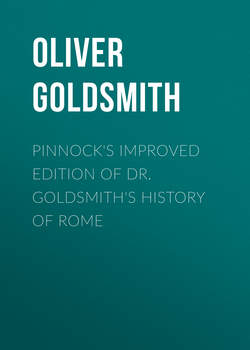Читать книгу Pinnock's improved edition of Dr. Goldsmith's History of Rome - Oliver Goldsmith - Страница 15
HISTORY OF ROME
CHAPTER IV.
FROM THE DEATH OF NUMA TO THE DEATH OF TULLUS HOSTILIUS THE THIRD KING OF ROME. – U.C. 82
ОглавлениеFrom either army shall be chose three champions,
To fight the cause alone. —Whitehead.
1. At the death of Nu'ma, the government once more devolved upon the senate, and so continued, till the people elected Tullus Hostil'ius for their king, which choice had also the concurrence of the other part of the constitution. This monarch, the grandson of a noble Roman,58 who had formerly signalized himself against the Sab'ines, was every way unlike his predecessor, being entirely devoted to war, and more fond of enterprise than even the founder of the empire himself had been; so that he only sought a pretext for leading his forces to the field.
2. The Albans, by committing some depredations on the Roman territory, were the first people that gave him an opportunity of indulging his favourite inclinations. The forces of the two states met about five miles from Rome, prepared to decide the fate of their respective kingdoms; for, in these times, a single battle was generally decisive. The two armies were for some time drawn out in array, awaiting the signal to begin, both chiding the length of that dreadful suspense, when an unexpected proposal from the Alban general put a stop to the onset. 3. Stepping in between both armies, he offered the Romans to decide the dispute by single combat; adding, that the side whose champion was overcome, should submit to the conqueror. A proposal like this, suited the impetuous temper of the Roman king, and was embraced with joy by his subjects, each of whom hoped that he himself should be chosen to fight the cause of his country. 4. There were, at that time, three twin brothers in each army; those of the Romans were called Hora'tii, and those of the Albans Curia'tii; all six remarkable for their courage, strength, and activity, and to these it was resolved to commit the management of the combat.59 At length the champions met, and each, totally regardless of his own safety, only sought the destruction of his opponent. The spectators, in horrid silence, trembled at every blow, and wished to share the danger, till fortune seemed to decide the glory of the field. 5. Victory, that had hitherto been doubtful, appeared to declare against the Romans: they beheld two of their champions lying dead upon the plain, and the three Curia'tii, who were wounded, slowly endeavouring to pursue the survivor, who seemed by flight to beg for mercy. Too soon, however, they perceived that his flight was only pretended, in order to separate his three antagonists, whom he was unable to oppose united; for quickly after, stopping his course, and turning upon the first, who followed closely behind, he laid him dead at his feet: the second brother, who was coming up to assist him that had already fallen, shared the same fate. 6. There now remained but the last Curia'tius to conquer, who, fatigued and disabled by his wounds, slowly advanced to offer an easy victory. He was killed, almost unresisting, while the conqueror, exclaiming, "Two have I already sacrificed to the manes of my brothers, the third I will offer up to my country," despatched him as a victim to the superiority of the Romans, whom now the Alban army consented to obey.60
7. But the virtues of that age were not without alloy; that very hand that in the morning was exerted to save his country, was, before night, imbrued in the blood of a sister: for, returning triumphant from the field, it raised his indignation to behold her bathed in tears, and lamenting the loss of her lover, one of the Curia'tii, to whom she had been betrothed. This so provoked him beyond the powers of sufferance, that in a rage he slew her: but the action displeased the senate, and drew after it the condemnation of the magistrate. He was, however, pardoned, by making his appeal to the people, but obliged to pass under the yoke; an ignominious punishment, usually inflicted on prisoners of war.61
8. Tullus having greatly increased the power and wealth of Rome by repeated victories, now thought proper to demand satisfaction of the Sab'ines for the insults which had been formerly offered to some Roman citizens at the temple of the goddess Fero'nia, which was common to both nations A war ensued, which lasted some years, and ended in the total overthrow of the Sab'ines.
Hostil'ius died after a reign of thirty-two years; some say by lightning; others, with more probability, by treason.
Questions for Examination.
1. On whom devolved the government on the death of Numa, and what is the character of his successor?
2. What opportunity first offered of indulging the new king's inclinations?
3. What proposal was offered, and accepted for deciding the dispute?
4-6. Relate the circumstances which attended the combat, and the result of it.
7. What act followed the victory?
8. What conquest was next achieved?
58
It seems to have been part of the compact between the Romans and Sabines, that a king of each people should reign alternately.
59
The Hora'tii and Curia'tii were, according to Diony'sius of Halicarnas'sus, the sons of two sisters, daughters of Sequin'ius, an illustrious citizen of Alba. One married to Curia'tius, a citizen of Alba, and the other to Hora'tius, a Roman: so that the champions were near relatives.
60
This obedience of the Albans was of short duration; they soon rebelled and were defeated by Tullus, who razed the city of Alba to the ground, and transplanted the inhabitants to Rome, where he conferred on them the privileges of citizens.
61
Livy, lib. i. cap. 26. Dion. Hal. l. 3.
